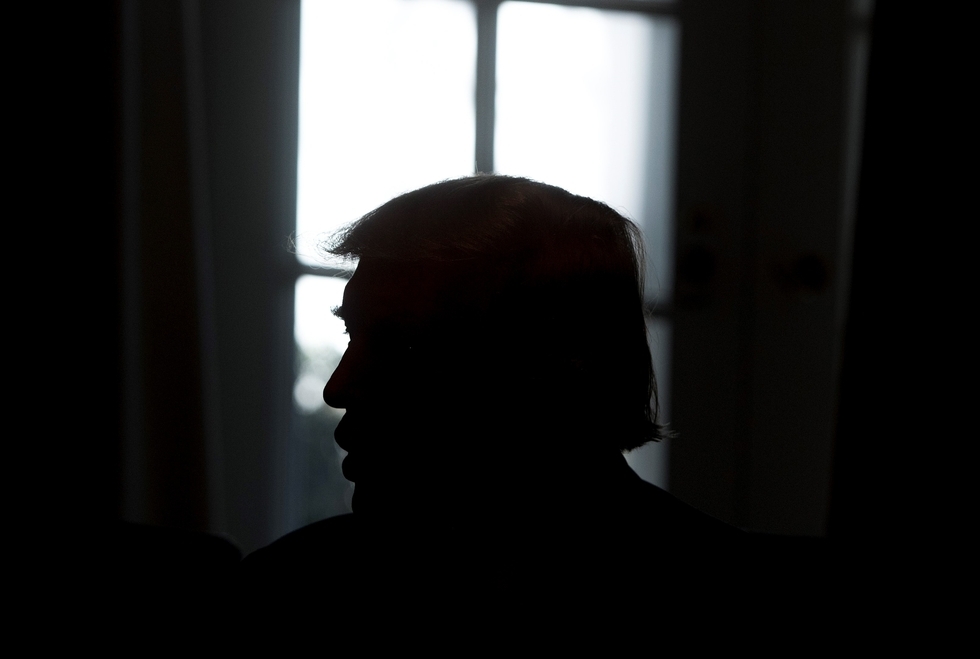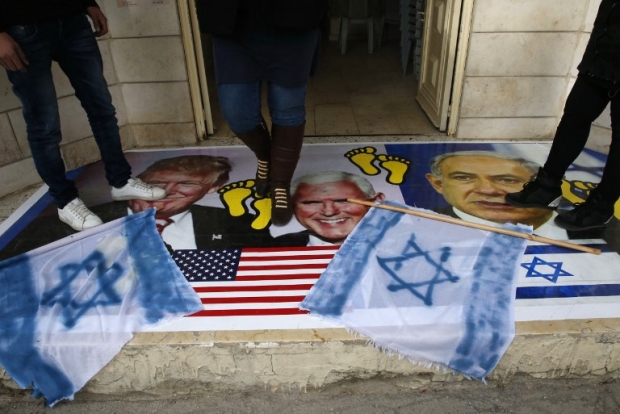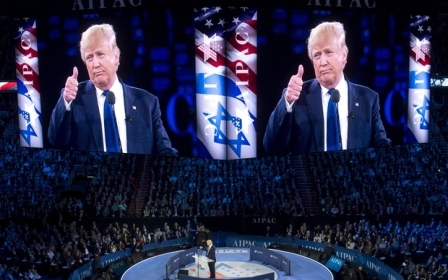'Why they hate us': The Arab side of the story

Since the outbreak of "global Jihad", US analysts struggled to agree on a concise list of answers to the American obsession with "why they hate us?"
Eager to find answers to this question, many American observers looked to the Arab world in particular and Muslims in general, both considered bastions of religious hatred, extremism and obscurantism to find plausible answers.
Pillars of US foreign policy
President Donald Trump's announcement recognising Jerusalem as Israel's capital and to move the US embassy to the city is perhaps the latest item on a long list of reasons for the alleged hatred, which in reality does not have anything to do with emotions but with objections and resistance to American foreign policy in the Arab world.
Over several decades, consistent US foreign policy in the region offered the Arab world a great opportunity to engage in anti-Americanism as an entrenched political position adopted by nationalists, socialists, and since the 1970s Islamists.
This US foreign policy rested on two pillars.
Trump's bold but expected move is bound to convince Arabs yet again of the persistent US support for Israel
First, the unequivocal support for Israel financially and militarily was consistent since the creation of the state in 1948. Israel became a moral prerogative for successive US presidents and administrations.
A threatened country, a beleaguered nation that had suffered the horrors of European anti-Semitism, and an island of democracy in an ocean of dictatorships, US administrations looked to the dot on the map of the eastern Mediterranean and were not able to see neither the ugly excesses of a satellite colonial state, nor the the Arab side of the story.
Second, while admiring and praising the allegedly flourishing Israeli democracy, the US persistently supported Arab dictators from Cairo to Riyadh. Like Israel, such dictators became sacrosanct, receiving millions of dollars in US aid, and provided with a useless military arsenal that neither protected US citizens, nor their interests in the region.
All politics is local
While the two pillars of US foreign policy remained unchanged, at societal level, thousands of Arab youth aspired to migrate to the US, to seek education, escape from the many wars that raged in the Arab world, in which Israel was a partner, and start a new secure life for their families.
Dreams became true for many while others faced suspicion, racial hatred, Islamophobia and, recently, bans on entry and ugly interrogation and humiliating encounters at airports.
Arabs do not need to spend too much time explaining why they reject US foreign policy. The two reasons are just enough. But for the US it is important to understand that their administrations have given Arabs plenty of opportunities to hate their foreign policy.
Anti-Americanism is not simply a sentiment but a real political position - recognising Jerusalem as Israel’s capital is simply the straw that broke the camel’s back.
Arabs are not convinced by the soul-searching exercise among defeated US Democrats, who explained Trump's Jerusalem move as a function of domestic politics in which Trump succumbs to the pressure of constituencies disproportionately influenced by the Jewish and evangelical lobbies.
Retired and marginalised US State Department bureaucrats have found a comfortable niche in think tanks to develop this thesis. The latest was in Beirut at the Carnegie Middle East Centre conference, "A World on Edge", where the first panel explained to an Arab audience the impact of domestic concerns in US foreign policy.
But a first year graduate in political science is told on day one that one of the most important foundations of the foreign policy of any country is the domestic audience. Students are taught that all politics is local. The US is no exception.
US support for Israel remained consistent. While a handful of US presidents promoted peace and ruled out confrontation, others hawkishly chose military intervention and a regime change strategy in the Arab world. Occupying Iraq in 2003 was not because the US reversed its support for dictators and put its military weight behind toppling an Arab dictator.
Imperial hubris
The US selectively and strategically picked on Saddam - as recent as the 1980s he was the man chosen to defeat the Iranian mullahs in Tehran in a long and bloody war on behalf of the US and its autocratic Gulf allies.
The invasion of Iraq was a moment of imperial hubris. An injured empire, unexpectedly hit hard in its financial and global trade centre on 9/11, was desperate to restore its image and demonstrate its might after being stung by hornets who had been close allies only a decade before in the caves of Tora Bora.
President Bush wanted to teach them a lesson. He chose Baghdad.
Other US presidents, like Barack Obama, retreated and opted for the management of the conflicts in the Arab world after he learned a hard lesson in Afghanistan and Iraq.
But Trump chose to revert back to confrontation and chose Jerusalem, a symbol of the Palestinian struggle for self-determination and liberation from occupation, at a moment when he felt Arab responses would be mild, ineffective and falling short of creating any discomfort for Washington and Israel.
Trump - and his son in law Jared Kushner - have secured the complicity of Riyadh despite the noises that King Salman made in his speech on Jerusalem.
US consistent support for a predatory state like Israel and unequivocal and unconditional endorsement of the "several devils they know" is ultimately the first and final cause of the Anti-Americanism
The king reiterated that the Palestinians have the right to east Jerusalem, a divided city under the complete domination of Israel, the occupying power which systematically destroys Palestinian homes and evicts the residents, thus making its municipality the richest in Israel, thanks to huge fines imposed on Jerusalemites.
In a context where report after report outlines the degree to which Saudi Arabia and other Gulf countries had proceeded with normalisation with Israel in security and economic matters, it is difficult to take the king's speech seriously.
As a close satellite Saudi state, Bahrain sent a delegation to Jerusalem consisting of a handful of personalities, including turbaned Shia clerics, to express good will. The Saudis had already paid visits to Israel and met with officials there. Other Arab presidents are compelled to make similar noises over Jerusalem.
A predatory state
Trump's bold but expected move, announced during his election campaign, is bound to convince Arabs yet again of the persistent US support for Israel. Jews and evangelicals cannot be convincing causes behind the decision as previous US presidents did not feel indebted to such lobbies yet pursued biased policies that favoured Israel.
Trump dared to do what others delayed.
From the Arab perspective, this support is grounded in the fact that Israel is one of the remaining colonial outposts. It is important to control the region and its resources far beyond the eastern Mediterranean shores.
Conflict with Israel has exhausted Arab economies, drained limited resources and diverted attention from the genuine struggle for democratic government, not to mention the destruction of the population and the flux of refugees in the last half century.
Arab dictators used the Palestinian cause to suppress the population, delay political change and divert attention from urgent development.
Others used Palestine to promote their Arab and Islamic credentials. From Saddam Hussein to King Faisal, Jerusalem was a good cause to ride.
Non-state actors like past and current resistance movements such as Hezbollah cannot possibly give up their arms while the might of Israeli airpower remains unchecked in the skies of Beirut. In fact, Hezbollah emerged in the context of an Israeli onslaught and occupation of half of Lebanon in 1982.
So, US consistent support for a predatory state like Israel and unequivocal and unconditional endorsement of the"several devils they know" is ultimately the first and final cause of the anti-Americanism that we have come to name as hate.
Neither Jewish nor evangelical lobbies are sufficient explanations for Trump's latest blunder.
The US needs a new paradigm to re-engage in the Arab world in ways that do not add insult to injury. But it seems unlikely that a retreating empire in a multipolar world is capable of making the desired paradigm shift.
Recognising Jerusalem as Israel's capital is symptomatic of a declining empire resorting to erratic and provocative decisions, a pattern similar to that witnessed in the last days of the collapse of Rome.
- Professor Madawi al-Rasheed is a visiting professor at the Middle East Centre at LSE. She has written extensively about the Arabian Peninsula, Arab migration, globalisation, religious transnationalism and gender. On Twitter: @MadawiDr
The views expressed in this article belong to the author and do not necessarily reflect the editorial policy of Middle East Eye.
Photo: US President Donald Trump speaks about tax reform legislation during a lunch with lawmakers working on the tax reform conference committee in the Cabinet Room at the White House in Washington, DC, December 13,2017 (AFP)
This article is available in French on Middle East Eye French edition.
New MEE newsletter: Jerusalem Dispatch
Sign up to get the latest insights and analysis on Israel-Palestine, alongside Turkey Unpacked and other MEE newsletters
Middle East Eye delivers independent and unrivalled coverage and analysis of the Middle East, North Africa and beyond. To learn more about republishing this content and the associated fees, please fill out this form. More about MEE can be found here.








